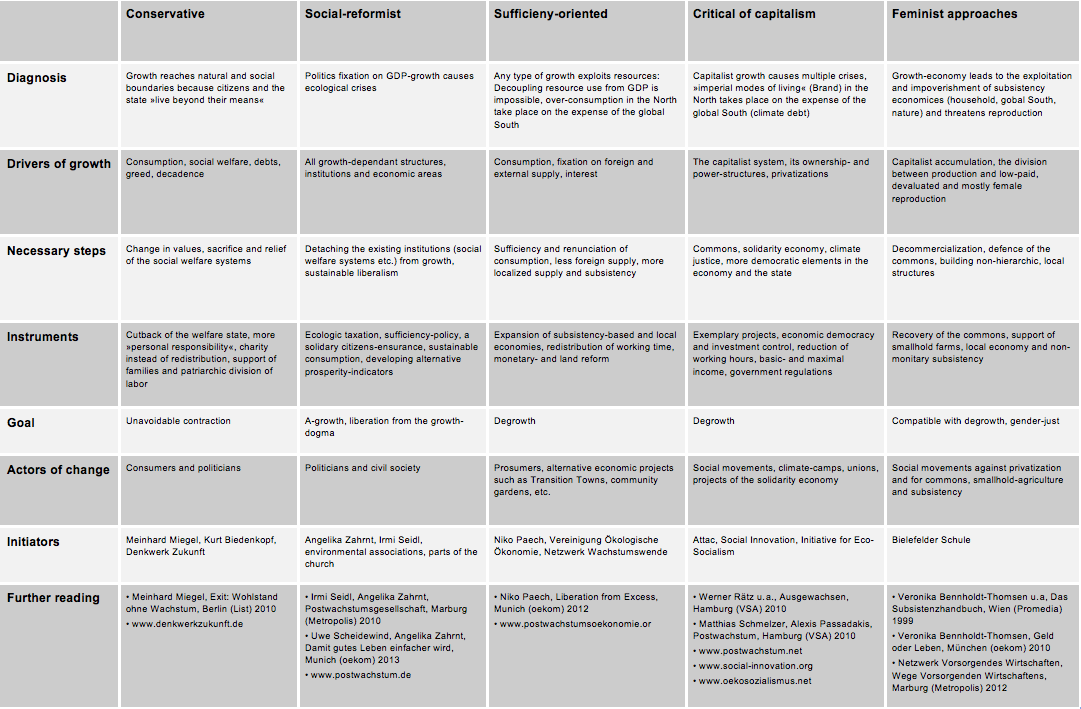How to sell degrowth is one of the questions of our research and communication project Postwachstumspioniere at the Institute for Ecological Economy Research. In the paper "Successful non-growing companies", Andrea Liesen, Christian Dietsche and myself are discussing motives and strategies that seem to apply to a variety of non-growing companies. We found that small and medium-sized companies (SMEs) very well distinguish between traditional growth in numbers and growth in qualities: not more but better appears to be a dominant management philosophy. If that is the case for a company, serveral characteristics might follow that are advantageous for the transition to a post-growth economy: a switch to repairability and services in producing companies, an increase in efficiency coupled with no sales growth to avoid rebound effects, the highlighting of product and service quality as well as qualities of work, life, and relations, and a strong collaborative and transformative claim. Nevertheless, non-growth of SMEs does by no means always point to a proactive post-growth strategy and respective social-ecological contributions.
Sarah Netter argues in her paper "Availability cascades & the sharing economy – A critical outlook at collaborative consumption" that we are to fast in accepting new concepts that will not only provide business opportunities but also a good conscience. She adds that there are still many open questions about the sharing economy: Is there really a high potential for sharing economies on the market? Do we maybe overestimate their contribution to a sustainable development? She outlines that those success factors of the sharing economy - like combining feel-good elements with business opportunities - at the same time bear a high risk of washing out the very basic idea of collaborative consumption possibly even leading to its downfall.
Valerio Verrea studied the Fair Trade market and identified an ideal type of alternative trade organisations (ATOs) that show a more effective and stable social and ethical performance than conventional businesses and even other fair trade organisations. In his paper "Fair Trade Alternative Organizations as a degrowth-friendly business model" he describes the characteristics of such an alternative entrepreneurial model and the social and structural features supporting it. He concludes that - against the shortcomings of other (fair trade) business models - ATOs demonstrate ways to escape the profit constraints of the dominant market system while at the same time blending social and economic value.
During the fruitful discussions in the workshop How to sell degrowth: Business models I we had a consensus that from a post-growth perspective there is much to learn from SMEs, shareconomy entrepreneurs and fair trade organizations but that we have to pay more attention to their side effects, especially when they are scaled and mainstreamed. To avoid watering-down of alternative business models, it seems to be crucial to outline a new and more sharpened narrative of post-growth business. To that end, the comparative study and evaluation of the various alternative entrepreneurial approaches with regard to common features and actual contributions to sustainability and degrowth seems to inevitable.
Comment on this article on the German Blog "Postwachstum"
The Well Planet Manifesto is an invitation to undertake an agenda of research that is closer to the state of emergency in which we find ourselves. It encourages researchers, activists, policy-makers and member of civil society to act according to this emergency. Those are invited to connect to one another by signing up the manifesto, in order to establish a research network. See the manife...

By Matthias Schmelzer The following article is a translation from the forthcoming “Atlas der Globalisierung”, that will be edited by Le Monde diplomatique and the Kolleg Postwachstumsgesellschaften (Universität Jena) under the title “Less is More. The Postgrowth-Atlas” (“Weniger wird mehr. Der Postwachstums-Atlas”. Postwachstum. Degrowth. Décroissance. These are buzzwords of a newly emergin...
Interview with Ole Bjerg Ole Bjerg is associate professor at the Copenhagen Business School. He writes for the ephemera Journal and is one of the organizers of the conference "Organizing for the post-growth economy". He gave us a short interview for the Stream towards Degrowth. Imagine we're living in the future, say in the year 2030, in a time of well-being. Humanity enjoys a good life ...